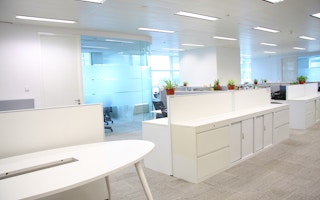Singaporeans are no strangers to technology. With a nation of early adopters, technologically savvy citizens use the latest mobile applications to add convenience to their daily routine. A few swipes on their mobile devices allow them to check on bus schedules or book a taxi, while a few clicks on their computers ensure the delivery of groceries to their doorstep.
To continue reading, subscribe to Eco‑Business.
There's something for everyone. We offer a range of subscription plans.
- Access our stories and receive our Insights Weekly newsletter with the free EB Member plan.
- Unlock unlimited access to our content and archive with EB Circle.
- Publish your content with EB Premium.
However, smart technology such as Home Automation (HA) has yet to make major headway in two domains of the average Singaporean’s life - their homes and offices. Although such technology can automate functions in personal or commercial premises to provide users with a higher level of convenience and comfort, most people do not use it. To date, HA has been catering only to a niche market, as the technology is commonly considered a luxury, rather than a necessity for living spaces.
According to market research firm Frost and Sullivan, the HA market in the region is set to grow to US$361.1 million by 2018.[i] With the proliferation and usage of smart phones and tablets in Asia Pacific, products such as smart lighting and motorised shades that can provide customised lighting by sensing movement will soon become more affordable to average consumers.
As the HA industry evolves to reach out to a wider market, more people will be made aware of the benefits that the technology brings. One key – but often neglected – aspect of where automation can make a big difference is lighting. From reduced energy usage in homes to improved efficiency at work, the myriad advantages that smart lighting controls bring to a property are often disregarded or sometimes unheard of.
Consumers can be observed adjusting the brightness settings on their mobile devices to suit their visual preference or save battery. However, they do not realise that the same principle can be applied to their home or office to improve the comfort of their residence and work ambiance.
The two main benefits of implementing a lighting control system at workplaces and homes are cost savings from reduced energy consumption and increased productivity.
Lower energy usage = Higher cost savings
“
Although such technology can automate functions in personal or commercial premises to provide users with a higher level of convenience and comfort, most people do not use it. To date, HA has been catering only to a niche market, as the technology is commonly considered a luxury, rather than a necessity for living spaces.
In any residential or commercial space, lighting expenses can be reduced by up to 40 per cent and the lifespan of the lamp extended by 20 times if the lights are dimmed by 50 per cent.
For commercial spaces, the savings from intelligent lighting technology can be realised on a bigger scale since lighting in a commercial building contributes to about 38 per cent of total energy output.Usage of daylight harvesting – the automatic adjustment of lights when sufficient daylight is present – allows an office space to save up to 60 per cent on energy costs.
Better lighting, more effective workspace
The majority of commercial spaces are over-lit and that can hinder productivity. Having the ability to control the lighting in conference rooms or individual workspaces allows for maximum versatility to suit the needs of each employee. More often than not, manual shades instead of motorised shades are installed. The shades either could not be or are seldom adjusted to fully utilise available daylight and minimise sun glare, which can enhance employees’ comfort and boosts productivity.
In a modern office environment, employees have to juggle between being efficient in both paperwork and computer work. However, even though typical lighting is adequate for paperwork, it is two to three times brighter than the ideal brightness for working on the computer.[v]
As the home automation industry grows year on year, the spotlight falls on intelligent lighting systems to control both electric light and daylight to reduce energy usage and cost, while enhancing productivity at the workplace.
With her sight set on becoming a smart nation, Singapore provides a tremendous platform for the adoption of intelligent lighting and is well positioned to cater to the industry’s demand for innovative smart lighting control systems.
Boon Liang Seng is director of sales, Southeast Asia, Lutron Electronics. This article was written exclusively for Eco-Business.








